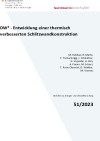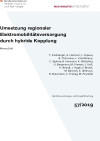Suchergebnisse für "Factsheet: Energietechnologien gestalten, die für alle sinnvoll und nutzbar sind"
DW² - Entwicklung einer thermisch verbesserten Schlitzwandkonstruktion

Die thermischen Eigenschaften von Schlitzwandkonstruktionen werden durch die Anwendung neuer Materialien und Herstellungsmethoden verbessert und durch Labor- und Feldversuche validiert sowie durch numerische und ökologische Betrachtungen ergänzt. Das Ergebnis kann bei der Errichtung von energetisch verbesserten unterirdischen Bauwerken wie beispielsweise Tiefgaragen oder zur Herstellung von Erdwärmespeichern verwendet werden.
Schriftenreihe
51/2023
M. Rebhan, R. Marte, F. Tschuchnigg, J. Schleicher, G. Vojvodic, H. Kim, A. Passer, M. Scherz, T. Potrc Obrecht, G. Winkler, M. Vremec
Herausgeber: BMK
Deutsch, 55 Seiten
Downloads zur Publikation
Move2Grid - Umsetzung regionaler Elektromobilitätsversorgung durch hybride Kopplung
Aufbauend auf den Ergebnissen der „Stadt der Zukunft“ Sondierungsprojekte „Smart Exergy Leoben“, und „Energieschwamm Bruck“ soll im gegenständlichen,umsetzungsorientierten Forschungsvorhaben anhand des Beispiels Leoben untersucht werden, wie mit regionalen, erneuerbaren Ressourcen regionale Elektromobilität langfristig versorgt, optimal ins kommunale Verteilernetzsystem integriert und ökonomisch nachhaltig implementiert werden kann.
Smart Energy Systems / SESWA - Award
Im Rahmen der Smart Energy Systems Week wird der "Smart Energy Systems Award“ in vier Kategorien vergeben und zeichnet neben herausragenden wissenschaftlichen Arbeiten und Forschungsprojekten auch konkrete Demonstrationsvorhaben und Start Ups aus.
Umsetzung regionaler Elektromobilitätsversorgung durch hybride Kopplung (Move2Grid)

Aufbauend auf den Ergebnissen der „Stadt der Zukunft“ Sondierungsprojekte „Smart Exergy Leoben“, und „Energieschwamm Bruck“ soll im gegenständlichen,umsetzungsorientierten Forschungsvorhaben anhand des Beispiels Leoben untersucht werden, wie mit regionalen, erneuerbaren Ressourcen regionale Elektromobilität langfristig versorgt, optimal ins kommunale Verteilernetzsystem integriert und ökonomisch nachhaltig implementiert werden kann.
Schriftenreihe
57/2019
T. Kienberger, A. Hammer, J. Vopava, B. Thormann, L. Kriechbaum, C. Sejkora, R. Hermann, K. Watschka, U. Bergmann, M. Frewein, J. Koß, H. Brandl, J. Vogel, S. Moser, M. Baresch, K. de Bruyn, R. Braunstein, C. Freitag, M. Peyreder
Herausgeber: BMVIT
Deutsch, 172 Seiten
Downloads zur Publikation
ÖKO-OPT-QUART - Economically optimized control and operating mode of complex energy networks of future city districts
In the project ÖKO-OPT-QUART energy-based, economic and control-orientated models will be developed in order to simulate the operating mode of complex, sustainable energy networks in city districts. For an exemplary configuration these models will be combined to an overall model which allows a realistic economic comparison of different control strategies. The final goal of the project is the development of a method for the systematic design of cost-optimized, predictive control strategies for complex energy networks in city districts.
Move2Grid – Implementation of regional energy-supply-concepts by hybrid coupling
Based on the results of the national-funded exploratory projects called “Smart Exergy Leoben”, and “Energy Sponge Bruck”, the present implementation project aims at analysing how local, renewable resources support the supply of electric mobility in Leoben in the long term and to integrate it into the municipal distribution grid in a good economic sense.
ecoRegeneration: Development of a "Merit-Order" in order to assess regeneration heat for geothermal probes within urban residential neighbourhoods
In urban residential areas there are not enough active-cooled usages, to use the waste heat of the cooling process as required regeneration heat for geothermal probes; free cooling of the apartments is not sufficient. The project is developing various options (waste heat from commercial uses in the ground floor zones of residential buildings, by using waste heat of data centres, additional installation of heat generation systems for regeneration) within the urban settlement area, business models and is calculating life-cycle-costs of all solutions. The result should be a kind of "merit order" for regeneration heat.
REC-Businesspark - Investigation of the first Austrian renewable energy community business and industrial park
In the course of the project, the conceptual design of a zero-emission or plus-energy business park in Weiz with a focus on photovoltaics and fuel cells in combination with a Renewable Energy Community (E-EGe) had been carried out. By establishing the park on a "greenfield", all structures can be created according to the requirements of the E-EGe.
CityStore - Sondierung des wesentlichen F&E-Bedarfs zur Optimierung von städtischen Energiespeichern in integrierten Energiesystemen
CityStore pursues a first-of-its-kind, innovative approach on spatial location of storage needs and potentials. This includes the evaluation of concrete challenges and prerequisites as well as the identification of useful storage technologies and capacities. Model calculations for the model cities Graz and Weiz will be carried out. If, and to which extent, the results can be generalized will be investigated in the Follower Region South Burgenland. The results should enable optimized planning and realization of urban energy storage facilities – thereby enabling targeted investments in energy infrastructure to achieve (local) climate and energy targets.
SeasonalGridStorage - Innovative seasonale thermal storages for urban district heating grids
Sensible storages, which are currently used in district heating networks for seasonal storage of excess heat (e.g. from solar thermal or industrial waste heat), exhibit high space demand, investment costs and heat losses. Within this project, concepts for using innovative storage technologies, e.g. thermochemical storages (TCS) having high heat densities and enabling pressure- and lossless storage, were developed and analyzed on a technological, economic and ecological basis. Additionally, the regulatory framework has been evaluated.
Eco.District.Heat - Potentials and restrictions of grid-bound heating systems of urban areas
Aim of the project Eco.District.Heat is to provide strategic decision-making support that enables Austrian towns and cities to deal with aspects of grid-bound heating (and cooling) systems in accordance with integrated spatial and energy planning from a holistic perspective when elaborating urban energy concepts.
Stakeholder process of the initiative "Reference architecture for secure Smart Grids in Austria"
The project worked out the development of a smart grids reference architecture for Austria under involvement of all actors. Based on technological-scientific elements a process which met the requirements of stakeholders like operators of infrastructure, industry and also public agencies had been worked out to achieve nationally accepted and internationally orientated reference architecture.
SOFC4City - SOFC-waste heat utilization for buildings and industry
In this project the application of a solid oxide fuel cell (SOFC) for energy supply (heat and power) of urban areas will be investigated. Due to the high temperature level of the produced heat it would be possible to use this heat for the energy supply of different heat and power consumers (residential buildings, industrial plants, etc.). One aim is to provide the SOFC-heat at several temperature levels in order to establish the advantages of the fuel cell. On the one hand the legal and market-based conditions will be evaluated, on the other hand the technological feasibility will be scoured by the use of CFD-simulation of the heat production.
